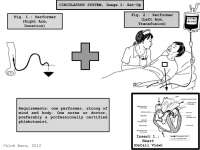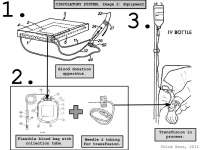Chloë Bass CIRCULATORY SYSTEM
CIRCULATORY SYSTEM is an unrealized performance project that was never completed due to my partner’s concern for my health. In general, I am able to move forward with my work regardless of outside concern, but in this case, I allowed the heart (emotional) to guide the behavior of the heart (physical) and never undertook the performance.
Self-recognition – loosely defined as the ability to look in the mirror and recognize the reflection as you – is what separates humans from most animals. A critical survival strategy and an essential element of maturity and self-development, self-recognition protects us from the foreign and assists us in integrating the domestic. It is through self-recognition that we shape our worlds.
I met with Pablo Polosecki, a Theory of Mind researcher, as part of my video series AN EXPERT A DAY and he suggested that perhaps the best person to meet with to discuss more elemental forms of self-recognition (from the scientific perspective) would be an immunologist. The inability of the body to recognize itself is one of the most fascinating and terrible destructions that man can bring upon himself. (I say this thinking of individuals, but I believe it also extends to a larger global metaphor of inequality and violence.)
Yet all too often the amazing success of our bodies self-recognizing goes unnoticed. CIRCULATORY SYSTEM externalizes the process of blood giving (and getting) as a performer simultaneously donates blood and receives a transfusion of his or her own donated blood. The performance lasts for as long as the performer is willing or able to physically maintain the condition of performance. Everything takes place under the supervision of a doctor or nurse, preferably a certified phlebotomist.
I am not entirely certain that this performance is medically possible. I have asked several doctors and they offer no comment. However, it seems to me that with a controlled flow of blood (both in and out), the body would not notice the externalization of the system. It would amaze me to view a body that is both self-sustaining, and managed by the visible other of the equipment.
Of course if the performance could not be maintained (i.e. if the performer faints, exhibits signs of cardiac distress, or is otherwise physically unable or unadvised to continue), this failure would also be quite interesting. At what point does the body fail in the presence of externalization and begin to treat itself like an other? And why might this occur? Measuring the results in an easily quantifiable, chartable way begins to create quasi-rational explanations for otherwise “soft” processes.
CIRCULATORY SYSTEM is an exercise of the Bureau of Self-Recognition, a five phase conceptual investigation that I began in October 2011. The Bureau of Self-Recognition (realized; in process) is performance and installation project designed to track the process of self-recognition and its myriad outcomes. Through individual exercises, spatial investigations, video and audio recording, lectures, and experiential performance, the Bureau will bring together the clinical and the personal in a unique institutional environment. You can visit the Bureau of Self-Recognition online at bureauofselfrecognition.com.
Chloë Bass CIRCULATORY SYSTEM
CIRCULATORY SYSTEM is an unrealized performance project that was never completed due to my partner’s concern for my health. In general, I am able to move forward with my work regardless of outside concern, but in this case, I allowed the heart (emotional) to guide the behavior of the heart (physical) and never undertook the performance.
Self-recognition – loosely defined as the ability to look in the mirror and recognize the reflection as you – is what separates humans from most animals. A critical survival strategy and an essential element of maturity and self-development, self-recognition protects us from the foreign and assists us in integrating the domestic. It is through self-recognition that we shape our worlds.
I met with Pablo Polosecki, a Theory of Mind researcher, as part of my video series AN EXPERT A DAY and he suggested that perhaps the best person to meet with to discuss more elemental forms of self-recognition (from the scientific perspective) would be an immunologist. The inability of the body to recognize itself is one of the most fascinating and terrible destructions that man can bring upon himself. (I say this thinking of individuals, but I believe it also extends to a larger global metaphor of inequality and violence.)
Yet all too often the amazing success of our bodies self-recognizing goes unnoticed. CIRCULATORY SYSTEM externalizes the process of blood giving (and getting) as a performer simultaneously donates blood and receives a transfusion of his or her own donated blood. The performance lasts for as long as the performer is willing or able to physically maintain the condition of performance. Everything takes place under the supervision of a doctor or nurse, preferably a certified phlebotomist.
I am not entirely certain that this performance is medically possible. I have asked several doctors and they offer no comment. However, it seems to me that with a controlled flow of blood (both in and out), the body would not notice the externalization of the system. It would amaze me to view a body that is both self-sustaining, and managed by the visible other of the equipment.
Of course if the performance could not be maintained (i.e. if the performer faints, exhibits signs of cardiac distress, or is otherwise physically unable or unadvised to continue), this failure would also be quite interesting. At what point does the body fail in the presence of externalization and begin to treat itself like an other? And why might this occur? Measuring the results in an easily quantifiable, chartable way begins to create quasi-rational explanations for otherwise “soft” processes.
CIRCULATORY SYSTEM is an exercise of the Bureau of Self-Recognition, a five phase conceptual investigation that I began in October 2011. The Bureau of Self-Recognition (realized; in process) is performance and installation project designed to track the process of self-recognition and its myriad outcomes. Through individual exercises, spatial investigations, video and audio recording, lectures, and experiential performance, the Bureau will bring together the clinical and the personal in a unique institutional environment. You can visit the Bureau of Self-Recognition online at bureauofselfrecognition.com.

